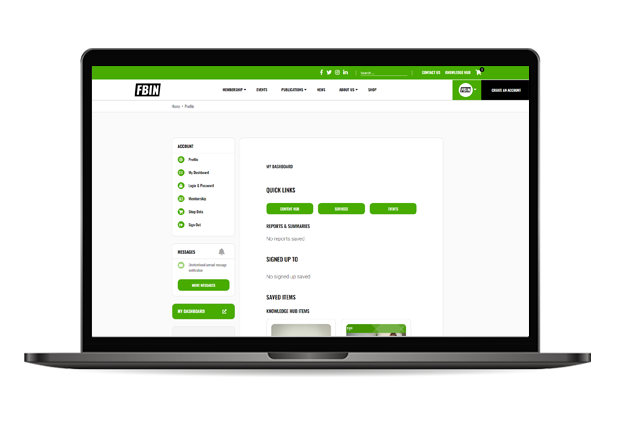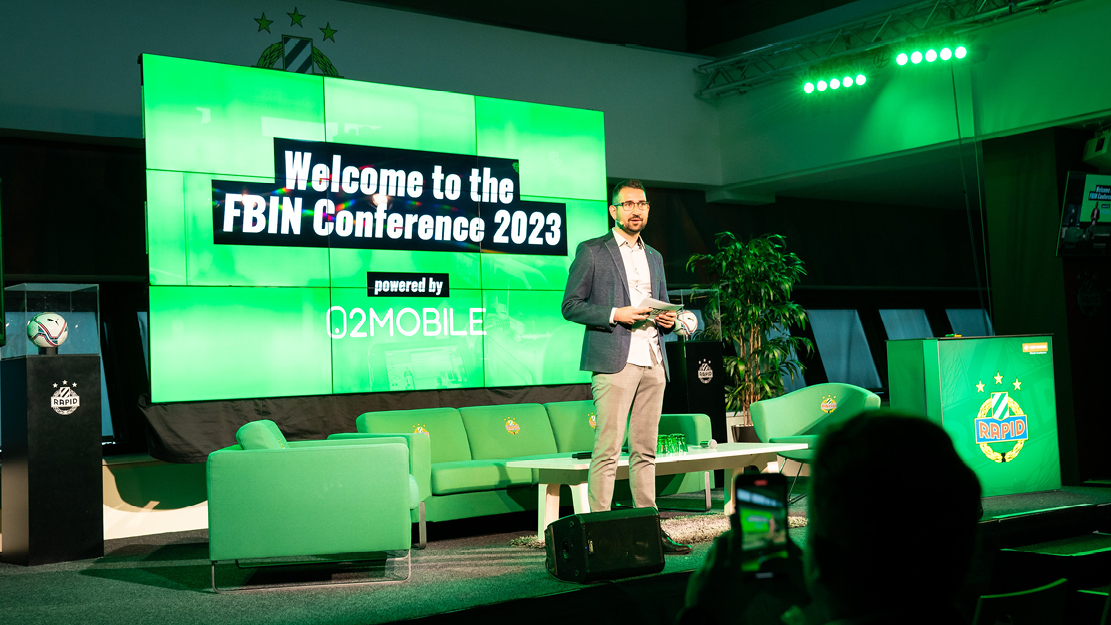Three years post-pandemic, the FBIN Conference, powered by 2Mobile, made its return to the iconic Allianz Stadion of SK Rapid. Set against the picturesque autumn backdrop of Vienna, attendees were met with a crisp atmosphere, complemented by the sun’s gentle warmth. In this article, we will journey through the day, capturing some of the event’s key highlights and insights.
By Quang T. Pham
CLUB/LEAGUE STRATEGY AND MANAGEMENT
The conference commenced with an insightful interview on how a streamlined recruiting process can transform a club’s culture and performance. We had the privilege of hearing from Zoe Brough, HR Director from Wolves, and her intriguing journey from the music industry to football. Before joining Wolves, there was no established HR department. Upon her arrival, the focus shifted towards implementing best practices, enhancing job descriptions, and streamlining the application process. These HR strategies fortified Wolves’ competitive edge, notably against regional competitors like Villas and Leicester.
“You’ve got to understand together what it is you’re trying to achieve with the management, both in the short term and possibly the long term. It’s about identifying key principles, integrating them into processes, fostering open communication. It’s all about consistency and effective communication.” – Zoe Brough
Zoe Brough, HR Director of Wolves FC
Michal Krcek, Business Development Manager from AC Sparta Praha, took center stage to narrate the story of the Czech Republic’s biggest football club’s return to glory. He recalled the challenging times from 2015 to 2022, marking it as one of the club’s most difficult periods, devoid of titles. Despites the challenges, the club managed to break a 40-year matchday attendance record last season. Strategic decisions taken towards this turnaround included significant infrastructure investments, revamping the matchday program to enhance fan experience, mandatory fan registration, and many more.
“My recommendation to anyone is to look beyond just on-pitch results and truly prioritize the fans. At the end of the day, they are what truly matter.” – Michal Krcek
Michal Krcek, Business Development Manager of AC Sparta Praha
See more details in this exclusive interview: AC Sparta Praha’s blueprint for record-breaking matchday attendance
In the presentation of the 5-year strategy for the Austrian Bundesliga, CEO Christian Ebenbauer outlined the league’s growth pillars: Top Sport, Competition Guardians, Leisure Activity, Social Role Model, and Women’s Football. Additionally, an engaging panel discussion took place later between Christian Ebenbauer and Michal Mertinyak, Executive Director of the Slovak Football League, discussing their joint efforts to enhance success and support their clubs from the perspective of league organizers.
Another incredible story is from Dimitrios Giannelis, CEO of Aris Limassol FC. He recounted Aris Limassol FC’s fairy-tale ascent from the second tier to the Cyprus Champions and the Europa League Group Stage. Dimitrios also emphasized the power of vision and partnering with like-minded individuals. Growing from 2 to 25 employees, they’ve prioritized stadium enhancements and set up an academy to foster talent and widen their fanbase, eyeing consistent progress annually.
“Many people talk about the importance of good management and best coaching, but first and foremost, you must have a clear vision. It’s the foundation for innovation and change. Then you must find the people who share that same vision.” – Dimitrios Giannelis
Dimitrios Giannelis, CEO of Aris Limassol FC
INNOVATION & GROWTH
Matjaz Mozina, CEO of 2Mobile, the event’s presenting sponsor, emphasized that AI isn’t solely for customer service; it plays a pivotal role in fan engagement and communication.The primary reason for clubs to embrace AI technology is to reduce operational costs and enhance customer satisfaction. For instance, one of the most significant expenses businesses face is related to emails, which can be mitigated through automated bot responses that provide quick information. Matjaz also debunked the common misconception about AI: it doesn’t just take away jobs but can also create new employment opportunities.
Matjaz Mozina, CEO of 2Mobile
Thomas Rypens, Direct-to-Consumer Director of Club Brugge, delivered a riveting presentation on the pivotal role fan data plays in his club’s growth. He emphasized the shift from mere data collection to meaningful insights. The Belgian powerhouse employs a mix of qualitative and quantitative data collection methods, ranging from in-store observations and fan focus groups to comprehensive surveys. Thomas also pulled out their real-life case study: “How to increase matchday purchase since fans don’t want to wait in queues?” by using data analytics. The key takeaways?
- Some feedback is better than no feedback
- Consistency is key to be able to spot patterns
- Kill your darlings if the data tells you so
Thomas Rypens, Direct-to-Consumer Director of Club Brugge
In the panel discussion on taking football clubs to the next level, Emir Samanci (Director of Marketing & Commercial, United World) emphasized the need to embrace risks instead of preserving the status quo, highlighting the importance of club culture. Siegmund Gruber (Chairman, LASK) discussed maximizing new stadium opportunities, citing hospitality is key to revenue generation. Gustavo Spannho focused on Everton’s international initiatives like partnerships in the US and stressed the significance of localization for commercial opportunities. Richard Feuz (Servette FCCF) emphasized the distinct roles of academy and women’s teams.
From left to right: Siegmund Gruber (LASK Linz), Gustavo Spanholi (Everton FC), Emir Samanci (United World) and Richard Feuz (Servette FCCF)
FOOTBALL FINANCE & GOVERNANCE
Michael Verschueren (ECA); Lars Hülsmann (OneTouch Football), Kuno Tehva (Kalju FC & Viktoria Plzen), and Raphael Landthaler (Viktoria Plzen) shed light on the panel discussion about purchasing a football club and ensuring its success. They explored crucial topics such as:
- Best practices for purchasing a club.
- The Multi-Club Ownership model, its potential, and the necessary regulations.
- The relevance of the 50+1 rule in the EU ecosystem.
- Investment prospects in the Baltic region.
- The evolving landscape of football investments for the future.
From left to right: Lars Hülsmann (OneTouch Football), Raphael Landthaler (Viktoria Plzen), Kuno Tehva (Kalju FC & Viktoria Plzen), Michael Verschueren (ECA), Dr. Robert Kaspar (Moderator)
Another hotly debated topic is the competitive imbalance in European football. Dennis Gudasic, the CEO of Lokomotiv Zagreb FC, along with William Martucci from the Union of European Clubs, highlighted the significant dependence many European clubs have on UEFA competitions for revenue. Surprisingly, some clubs rely on it for up to 50% of their income, with Lokomotiv Zagreb serving as an example.
Furthermore, upcoming economic shifts appear to tilt in favor of the elite clubs. From a governance perspective, a mere 137 clubs possess voting rights regarding revenue distribution, sidelining over other 1400 clubs. This inequity led to the inception of the Union of European Clubs, aiming to ensure an equal voice for all clubs throughout Europe.
“There are two factors that will influence the club’s ability to develop. One is, of course, knowledge and managerial strategy. Still, what’s also important is the governance model and the opportunities that this governance model provides for all clubs. …We shouldn’t have a system in which other clubs that are currently at the top preserve their position and prevent others from progressing.” – Dennis Gudasic, Co-Founder, Union of European Clubs
Dennis Gudasic, Co-Founder, Union of European Clubs
FAN ENGAGEMENT & SUSTAINABILITY
Like all other industries, football is also held accountable for the environment. At the conference, Egon Prünster and Georg Pangl underscored the overlooked CO2 emissions resulting from football fans’ travel to matches. They explained how Ummadum is actively promoting sustainable travel among fans and their broader vision to integrate football clubs, sponsors, communities, and even cities into this sustainable fan mobility movement.
Georg Pangl (left) & Egon Prünster (right)
See more details from our exclusive interview: Greening the Game: Pioneering sustainable fan mobility
Luis Arregui, Head of International Business Development from C.A. Osasuna discussed the club’s journey from the verge of bankruptcy to achieving an impressive 337% revenue increase in just 5 years. Osasuna’s success is anchored in a sustainable and community-centric management model. The ‘Tajonar method’, emphasizing youth and grassroots, shaped their sporting dimension, while local partnerships fueled their business growth.
Luis Arregui, Head of International Business Development from C.A. Osasuna
Adam Pavella and Flora Adouki of DAC 1904 emphasized their diverse Hungarian and Slovak fanbase and successful matchday attendance. Drawing from her Gen Z perspective, Flora introduces fresh marketing elements into their strategies. They’ve innovated with region-inspired kits and Ultra partnerships, and boast a 61% female TikTok following. The DAC Academy focuses on youth, and the diverse fanbase enriches their marketing, unified by ONE football passion.
Adam Pavella (left) and Flora Adouki (right) of DAC 1904
Beyond the primary keynote presentations at the main stage, there were also breakout sessions that served as masterclasses on diverse topics. FBIN Team would like to extend our heartfelt gratitude to all the speakers, organizers, and attendees for their invaluable contributions to the success of this event.
“The FBIN conference has once again proven to be a gathering of amazing industry experts from all over Europe. We want to bring high quality and really valuable practical content to the stage and I think the FBIN team and especially the speakers did a great job and achieved this goal. Thank you to all the participants and all the partners of the event – we are already looking forward to the next edition,” says Thomas Maurer, Managing Director of FBIN.
The recordings of all sessions will be available soon in our Knowledge Hub – exclusively for members.
Looking forward to seeing you at FBIN upcoming events! Don’t miss out on our field trip in Linz this November. Get all the details and join us here.


 Upgrade to Premium Now
Upgrade to Premium Now






